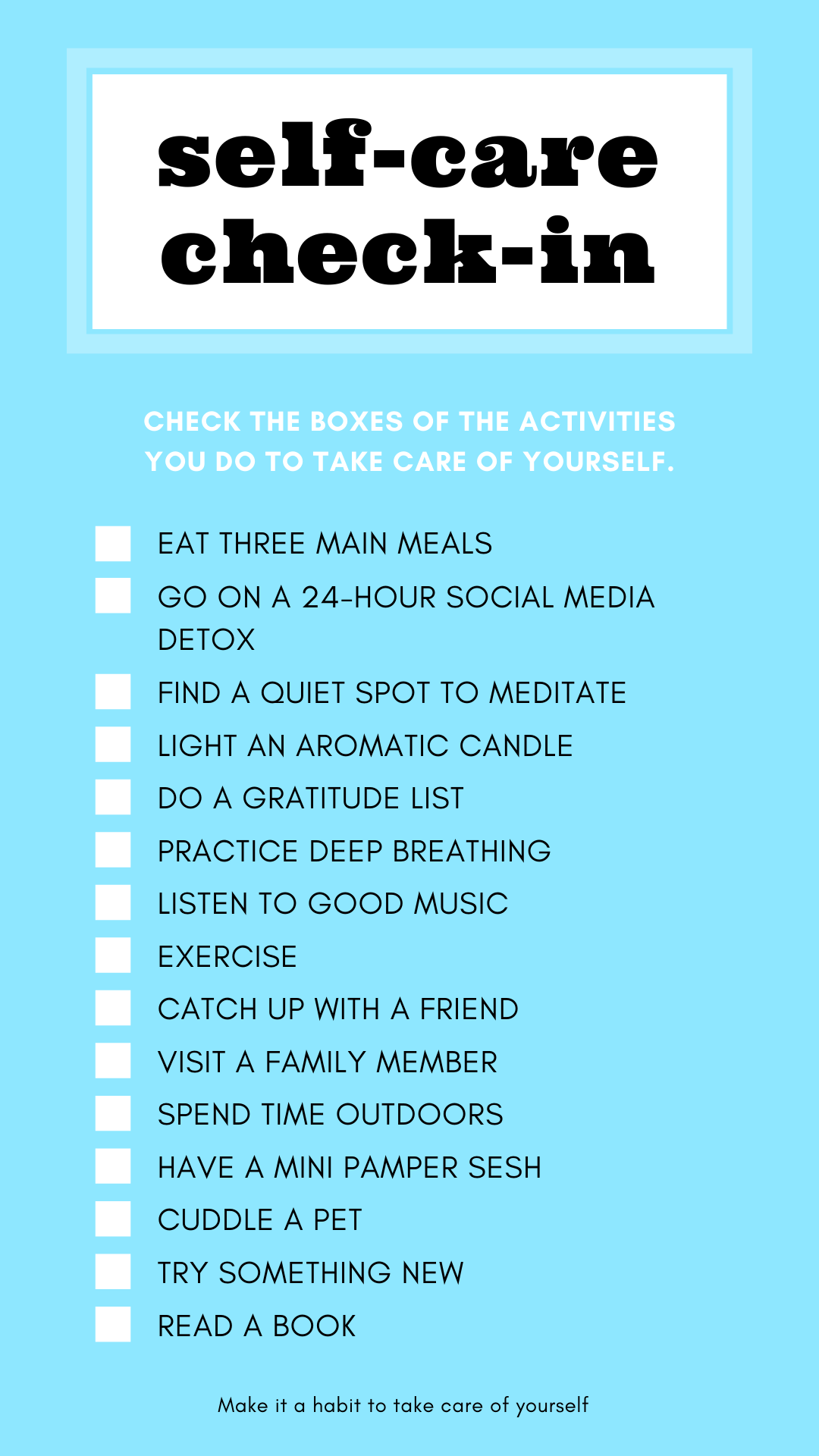Ways To Improve Your Self-Care Strategies
By Christina Fenske

Are you making it a habit to look after your self-care? (at the bottom of the page is a Ways To Improve Your Self-Care Strategies Check-In for you to complete)
Why is looking after your self-care strategies so important?
It’s important to look after your self-care because our mental health which includes our emotional, psychological, and social well-being. This all impacts how we feel, act and decide to make certain choices about things and even how we connect or relate to others in our lives. Having good mental health is essential to living a more balanced quality of life. Your self-care plays a pivotal role in sustaining your mental health and wellness. It can also assist in supporting your treatment and healing if you have a mental health condition. Learn about Self-Sabotage Behaviours.
What are Self-Care Strategies?
There are different ways to improve your Self-Care Strategies. This often refers to making sure that you do things that assist you in living a better quality of life. It not only improves your mental health but it improves your physical health as well. There are many benefits of self-care which are decreasing your risk of chronic disease, lower your stress level, and maximize your energy. Even the smallest actions towards your self-care in your everyday life can have an impact but often we discount this or think it doesn’t amount to anything because we can’t see something tangible happening. We’ve included a Self-Care Check-In at the bottom of this article for you to complete. Don’t forget to go through it and complete your own.
Some of the top tips to improving and creating more self-care strategies in your life:
Increase your exercise. Even walking about 30-minutes per day can help increase your mood and enhance your health. The smallest amounts of exercise do improve your life, so don’t get discouraged, if you can’t do 30 minutes at one time. Do a few 15 minutes here and 15minutes there throughout the day which will add up.
Stay hydrated and eat a balanced diet. Drink lots of water to increase your energy which can help improve your focus. Limit the amount of caffeine in a day by drinking less coffee, tea, and soft drinks.
Prioritize your sleep. Ensure that you stick to a regular sleeping schedule by going to bed at the same time and getting up at the same time every day. Keep that routine for excellent sleep hygiene. Use a blue light filter on your devices and screens so that you make it easier for you to fall asleep. Anything you can do to reduce your blue light exposure is critical to allowing your melatonin to keep producing and helping you to fall asleep.
Relaxation and Stress Relief Figure out what makes you feel calm and relaxed whether it’s a relaxation app, breathing exercises, meditation, music or reading a book. What works for one person may not work well for the next. We’re all different and have different needs. Schedule time daily or even a few times a week for relaxation and stress-relieving strategies. Journalling can also help contribute to your self-care but do what works for you and if you don’t know what works for you then try it.
Change your mindset and establish your goals. Learn what resonates with you. Assess what needs to be done right now and what just can’t be put on the back burner. Learn to get good at saying, “NO” to new things or new tasks that are taking up too much time. Look at what you want to accomplish and how you would like to win in your life. Failure is a win because it’s the best way to learn how to do something better and you’ll learn to grow from this. Become mindful of what you have achieved in your life or even at the end of the day, and don’t focus on what you can’t do or haven’t been able to get done.
What is life trying to teach you and what can you be grateful for? Focus on what you are grateful for and be intentional about what that is and play it over and over in your mind.
Be positive when you can. Figure out and get to know what negative thoughts and beliefs you have that are unhelpful.
Connect to those that matter. Do things with friends and family to create memories, provide emotional support, and even practical help if you can.
Try to do better than you did yesterday but doing and being. Try our Self-Care Check-In below. Self-care varies for everyone and may look different for you. We can control what we are doing and how we do things. Identify what you enjoy and what you feel you need. This can be done through trying different things and learning and discovering more about what works best for you. Also, self-care is not meant to be an antidote for mental health issues, it is a way to understand what creates triggers in your symptoms and learn what coping skills work best for you to manage your mental health concerns.
Self-care looks different for everyone, and it is important to find what you need and enjoy. It may take trial and error to discover what works best for you. In addition, although self-care is not a cure for mental illnesses, understanding what causes or triggers your mild symptoms and what coping techniques work for you can help manage your mental health.
To learn more about other healthy mind and body practices for your overall wellness, see “Why It’s So Important for Your Health?”
For other ideas for healthy practices for your mind, body, surroundings, and relationships, see the National Institutes of Health (NIH) Wellness Toolkits.
You May Need Professional Help
Seek professional help if you are having severe or distressing symptoms that have lasted two weeks or more, such as:
- Difficulty sleeping
- Appetite changes that result in unwanted weight changes
- Struggling to get out of bed in the morning because of mood
- Difficulty concentrating (Try a Guided Visualization.)
- Loss of interest in things you usually find enjoyable
- Inability to perform usual daily functions and responsibilities
Don’t wait until your symptoms are overwhelming. Talk about your concerns with your primary care provider, who can refer you to a mental health specialist if needed. If you don’t know where to start, read the National Institute of Mental Health (NIMH) Tips for Talking With Your Health Care Provider fact sheet. Learn more about how to get help or find a provider on the NIMH’s Help for Mental Illnesses webpage.
For additional information about suicide prevention, please see NIMH’s Suicide Prevention webpage.
Below is a Self-Care Check-In for you to review: It can be helpful to figure out ways you can improve your own self-care strategies in your life too.



